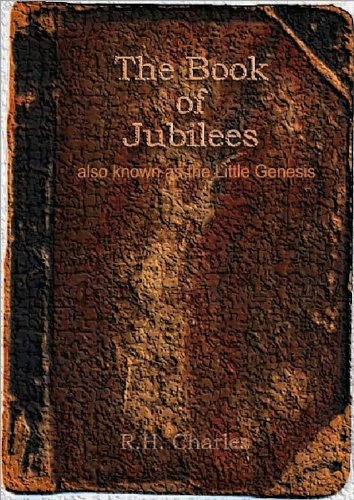-
The Book of Jubilees
R. H. Charles
Paperback (CreateSpace Independent Publishing Platform, Jan. 14, 2018)The Book of Jubilees, sometimes called Lesser Genesis (Leptogenesis), is an ancient Jewish religious work of 50 chapters, considered canonical by the Ethiopian Orthodox Church as well as Beta Israel (Ethiopian Jews), where it is known as the Book of Division . Jubilees is considered one of the pseudepigrapha by Protestant, Roman Catholic, and Eastern Orthodox Churches.It was well known to Early Christians, as evidenced by the writings of Epiphanius, Justin Martyr, Origen, Diodorus of Tarsus, Isidore of Alexandria, Isidore of Seville, Eutychius of Alexandria, John Malalas, George Syncellus, and George Kedrenos. The book was the major canonical literature of the ancient Jewish community indicated by the dominance of the number of copies found amongst all that were originally collected the Dead Sea Scrolls. No complete Hebrew, Greek or Latin version is known to have survived.The Book of Jubilees claims to present "the history of the division of the days of the Law, of the events of the years, the year-weeks, and the jubilees of the world" as revealed to Moses (in addition to the Torah or "Instruction") by angels while he was on Mount Sinai for forty days and forty nights. The chronology given in Jubilees is based on multiples of seven; the jubilees are periods of 49 years, seven "year-weeks", into which all of time has been divided.
-
The Book of Jubilees
R.H. Charles
eBookThe Book of Jubileestranslated by R. H. CharlesThe Book of Jubilees, or, as it is sometimes called, The Little Genesis, purports to be a revelation given by God to Moses through the medium of an angel and contains a history, divided up into "jubilee periods" of 49 years, from creation to the coming of Moses. Although the actual narrative of events is only carried down to Moses's birth and early career, its author envisages the events of a later time and in particular certain events of special interest at the time he wrote, which was probably in the latter years of the 2nd century B.C. This work, though containing one or two passages of an apocalyptic character, is quite unlike the typical apocalypses. It is largely based upon the historical narratives in Genesis and Exodus, interspersed with legends and emphasizing certain legal practices (such as the strict observance of the Sabbath, circumcision, etc.). The author's main object is to inculcate a reform in the regulation of the calendar and festivals in place of the lunar calendar, which he condemns. He proposes to substitute a solar calendar consisting of 12 months and containing 364 days. The result of such a system is to make all festivals, except the Day of Atonement, fall on a Sunday--a radical idea for its day. With notes clarifying the translation, this is an important text for students of the origins of Christianity and Essene teachings.
-
Why Did The Rise of the Nazis Happen?
Charles Freeman
Paperback (Gareth Stevens Pub Secondary Lib, Aug. 15, 2010)Examines the reasons for the rise of the Nazis, covering such factors as the harsh treatment of Germany by the victors of World War I, the unstable German economy, and the oratory and political ambitions of Adolf Hitler. Z
Z
-
The Closing of the Western Mind: The Rise of Faith and the Fall of Reason
Charles Freeman
eBook (Vintage, Dec. 18, 2007)A radical and powerful reappraisal of the impact of Constantine’s adoption of Christianity on the later Roman world, and on the subsequent development both of Christianity and of Western civilization.When the Emperor Contstantine converted to Christianity in 368 AD, he changed the course of European history in ways that continue to have repercussions to the present day. Adopting those aspects of the religion that suited his purposes, he turned Rome on a course from the relatively open, tolerant and pluralistic civilization of the Hellenistic world, towards a culture that was based on the rule of fixed authority, whether that of the Bible, or the writings of Ptolemy in astronomy and of Galen and Hippocrates in medicine. Only a thousand years later, with the advent of the Renaissance and the emergence of modern science, did Europe begin to free itself from the effects of Constantine's decision, yet the effects of his establishment of Christianity as a state religion remain with us, in many respects, today. Brilliantly wide-ranging and ambitious, this is a major work of history.
-
Why Did the Rise of the Nazis Happen?
Charles Freeman
Library Binding (Gareth Stevens Pub Secondary Lib, Sept. 27, 2010)Following their defeat during World War I, the Germans were looking for new leadership. Nazi Germany, also called the Third Reich, began when Adolf Hitler became Chancellor of Germany under the National Socialist German Workers Party (NSDAP) whose followers were called Nazis. Why the Germans embraced the Nazis rise to power is examined in this thoughtful book, which includes panels featuring subject-matter expert opinions to encourage critical thinking. Z
Z
-
The Closing of the Western Mind: The Rise of Faith and the Fall of Reason
Charles Freeman
Hardcover (Knopf, Oct. 12, 2003)A radical and powerful reappraisal of the impact of Constantine’s adoption of Christianity on the later Roman world, and on the subsequent development both of Christianity and of Western civilization.When the Emperor Contstantine converted to Christianity in 368 AD, he changed the course of European history in ways that continue to have repercussions to the present day. Adopting those aspects of the religion that suited his purposes, he turned Rome on a course from the relatively open, tolerant and pluralistic civilization of the Hellenistic world, towards a culture that was based on the rule of fixed authority, whether that of the Bible, or the writings of Ptolemy in astronomy and of Galen and Hippocrates in medicine. Only a thousand years later, with the advent of the Renaissance and the emergence of modern science, did Europe begin to free itself from the effects of Constantine's decision, yet the effects of his establishment of Christianity as a state religion remain with us, in many respects, today. Brilliantly wide-ranging and ambitious, this is a major work of history.
-
Maledicus: The Investigative Paranormal Society Book I
Charles F. French
eBook“All that is necessary for the triumph of evil is that good men do nothing.” (Edmund Burke) Roosevelt Theodore Franklin attempts to make it through life day by day. Roosevelt is a widower, who lost his beloved wife to cancer and a retired history professor, and he has not stopped grieving. Along with his two closest friends, also retired and who have also lost loved ones, the three men form a paranormal investigation group. They hope to find an answer to the question: is there life after death? When asked by a local teacher to investigate a possible haunting of her house, the group discovers an evil beyond anything they could have imagined. This is no mere ghost. Maledicus, who was in life a pimp, torturer, and murderer during Caligula’s reign in Rome, in death has become a sociopathic demon that attacks the weak and the innocent. Maledicus threatens a five year old child’s life and soul. Terrified by what they have discovered, Roosevelt and his friends must choose to either walk away from this threat , or to do battle with this ancient creature at the potential loss of their sanities, their lives, and their souls.
-
The Book of Jubilees
R. H. Charles
Paperback (Merchant Books, April 8, 2011)An Unabridged, Unaltered Edition of The Book of Jubilees or 'The Little Genesis,' From The Ethiopic Text, Comprising All Notes, Both Indices and Detailed Footnotes with Original Greek and Hebrew, To Include a Comprehensive (80 Page) Introduction.
-
Maledicus: The Investigative Paranormal Society Book I
Charles F. French
Paperback (CreateSpace Independent Publishing Platform, Oct. 12, 2016)“All that is necessary for the triumph of evil is that good men do nothing.” (Edmund Burke) Roosevelt Theodore Roosevelt Franklin attempts to make it through life day by day. Roosevelt is a widower, who lost his beloved wife to cancer and a retired history professor, and he has not stopped grieving. He and his two closest friends, also retired and who have also lost loved ones, form a paranormal investigation group. They hope to find an answer to the question: is there life after death? When asked by a local teacher to investigate a possible haunting of her house, the group discovers an evil beyond anything they could have imagined. This is no mere ghost. Maledicus, who was in life a pimp, torturer, and murderer during Caligula’s reign in Rome, in death has become a sociopathic demon that attacks the weak and the innocent. Maledicus threatens a five year old child’s life and soul. Terrified by what they have discovered, Roosevelt and his friends must choose to either walk away from this threat , or to do battle with this ancient creature at the potential loss of their sanities, their lives, and their souls.
-
The Book of Jubilees: Translation of Early Jewish and Palestinian Texts
R. H. Charles
Paperback (Forgotten Books, Nov. 30, 2007)Book Description: "The Book of Jubilees, probably written in the 2nd century B.C., is an account of the Biblical history of the world from creation to Moses. It is divided into periods ('Jubilees') of 49 years. For the most part the narrative follows the familiar account in Genesis, but with some additional details such as the names of Adam and Eve's daughters, and an active role for a demonic entity called 'Mastema'. The anonymous author had a preoccupation with calendar reform, and uses Jubilees as a platform for proposing a solar calendar of 364 days and 12 months; this would have been a radical departure from the Jewish Calendar, which is lunar-based. There are also a couple of messianic, apocalyptic passages, although quite a bit less than the Book of Enoch. The only complete version of Jubilees is in Ethiopian, although large fragments in Greek, Latin and Syriac are also known. It is believed that it was originally written in Hebrew. If at times one gets the impression that you are reading a first draft of Genesis, you are in good company. R.H. Charles, the translator, a distinguished academic Biblical scholar, concluded that Jubilees was a version of the Pentateuch, written in Hebrew, parts of which later became incorporated into the earliest Greek version of the Jewish Bible, the Septuagint." (Quote from sacred-texts.com)Table of Contents: Publisher's Preface; Editors' Preface; Introduction; Prologue; God's Revelation To Moses On Mount Sinai; God Commands The Angel To Write (i. 27-29); The Angel Dictates To Moses The PrimÆval History: The Creation Of The World And Institution Of The Sabbath (ii. 1-33; Cf. Gen. I.-ii. 3); Paradise And The Fall (iii. 1-35; Cf. Gen. ii. 4-iii.); Cain And Abel (iv. 1-12; Cf. Gen. iv.); The Patriarchs From Adam To Noah (cf. Gen. V.); Life Of Enoch; Death Of Adam And Gain (iv. 13-33); The Fall Of The Angels And Their Punishment; The Deluge Foretold (v. 1-20; Cf. Gen. vi. 1-12); The Building Of The Ark; The Flood (v. 21-32; Cf. Gen. vi. 13-viii. 19); Noah's Sacrifice; God's Covenant With Him (cf. Gen. viii. 20-ix. 17). Instructions To Moses About Eating Of Blood, The Feast Of Weeks, Etc., And Division Of The Year (vi. 1-38); Noah Offers Sacrifice; The Cursing Of Canaan (cf. Gen. ix. 20-28): Noah's Sons And Grandsons (cf. Gen. X.) And Their Cities. Noah's Admonitions (vii. 1-39); Genealogy Of The Descendants Of Shem: Noah And His Sons Divide The Earth (viii. 1-30; Cf. Gen. X.); Subdivision Of The Three Portions Amongst The Grandchildren: Oath Taken By Noah's Sons (ix. 1-15; Cf. Gen. X. Partly); Noah's Sons Led Astray By Evil Spirits; Noah's Prayer; MastÊmÂ; Death Of Noah (x. 1-17; Cf. Gen. ix. 28); The Tower Of Babel And The Confusion Of Tongues (x. 18-27; Cf. Gen. xi. 1-9); The Children Of Noah Enter Their Districts Canaan Seizes Palestine Wrongfully; Madai Receives Media (x. 28-36); The History Of The Patriarchs From Reu To Abraham (cf. Gen. xi, 20-30); The Corruption Of The Human Race (xi. 1-15); Abram's Knowledge Of God And Wonderful Deeds (xi. 16-24); Abram Seeks To Convert Terah From Idolatry; The Family Of Terah (cf. Gen. xi. 27-30). Abram Burns The Idols. Death Of Haran (cf. Gen. xi. 28) (xii. 1-14); The Family Of Terah In Haran; Abram's Experiences There; His Journey To Canaan (xii. 15-31; Cf. Gen. xi, 31-xii. 3); Abram With Lot In Canaan And Egypt (cf. Gen. xii. 4-20). Abram Separates From Lot (cf. Gen. xiii. 11-18) (xiii. 1-21); The Campaign Of Chedorlaomer (xiii. 22-29; Cf. Gen. xiv.); God's Covenant With Abram (xiv. 1-20; Cf. Gen. xv.); The Birth Of Ishmael (xiv. 21-24; Cf. Gen. xvi. 1-4. 11); The Feast Of First-fruits Circumcision Instituted. The Promise Of Isaac's Birth. Circumcision Ordained For All Israel (xv. 1-34; Cf. Gen. xvii.); Angelic visitation Of Abraham In Hebron; Promise Of Isaac's Birth Repeated. The Destruction Of Sodom And Lot's Deliverance (xvi. 1-9; Cf. Gen. xviii.-xix.); Abraham At Beersheba. Birth And Circum
-
The Book of Jubilees
R. H. Charles
Paperback (CreateSpace Independent Publishing Platform, June 26, 2011)The Book of Jubilees, probably written in the 2nd century B.C.E., is an account of the Biblical history of the world from creation to Moses. It is divided into periods ('Jubilees') of 49 years. For the most part the narrative follows the familiar account in Genesis, but with some additional details such as the names of Adam and Eve's daughters, and an active role for a demonic entity called 'Mastema'. The anonymous author had a preoccupation with calendar reform, and uses Jubilees as a platform for proposing a solar calendar of 364 days and 12 months; this would have been a radical departure from the Jewish Calendar, which is lunar-based. There are also a couple of messianic, apocalyptic passages, although quite a bit less than the Book of Enoch. The only complete version of Jubilees is in Ethiopian, although large fragments in Greek, Latin and Syriac are also known. It is believed that it was originally written in Hebrew. If at times one gets the impression that you are reading a first draft of Genesis, you are in good company. R.H. Charles, the translator, a distinguished academic Biblical scholar, concluded that Jubilees was a version of the Pentateuch, written in Hebrew, parts of which later became incorporated into the earliest Greek version of the Jewish Bible, the Septuagint.
-
Nellie Bly: Daredevil Reporter
Charles Fredeen
Library Binding (Lerner Pub Group, Oct. 1, 1999)A biography of the woman who helped pioneer "stunt" reporting at the turn of the century. Y
Y